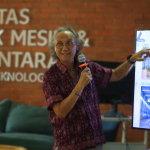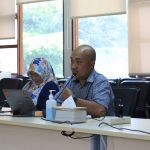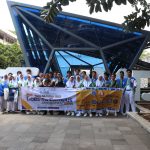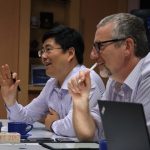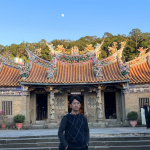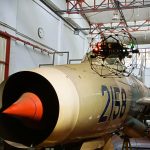FTMD Students Develop Innovative Automatic Rubber Tapping System
A team of students from the Faculty of Mechanical and Aerospace Engineering (FTMD) has developed an Internet of Things (IoT)-based automatic rubber tapping system to enhance the quality of rubber harvesting in Indonesia. The team was formed to participate in the Student Creativity Program – Innovative Work (PKM-KI) and consisted of four members, including Yuman Satriadi (Aerospace Engineering ’20) as the team leader, Pande Nyoman Dharmayasa Sugiana (Mechanical Engineering ’20), Muhammad Rafiuddin Rasyid (Mechanical Engineering ’20), and Muhammad Hilmi Fawwaz (Telecommunication Engineering ’20, STEI ITB).
Under the guidance of Dr. Ir. Aditianto Ramelan and with funding from Belmawa, the team’s innovation secured them the 1st place (equivalent to gold) in the presentation category at the 35th National Student Scientific Week (PIMNAS) held at Muhammadiyah University Malang from the 29th of November to the 4th of December 4 in 2022.
The project idea, automatic Rubber Tapping System, originated from the team leader, Yuman Satriadi, who recognized the potential to improve rubber farmers’ resources by enhancing the rubber tapping process. The team discovered that rubber prices in Indonesia tend to be low because most farmers still employ conventional tapping methods that do not adhere to optimal timing, resulting in low-quality rubber production.
To address this issue, the PKM-KI team developed an automatic rubber tapping device equipped with a rubber quality sorting mechanism. The device was designed with precise cutting thickness to meet the standards of good rubber quality. In testing, the device proved to be more effective and efficient than the conventional tapping methods still widely used by farmers.
Furthermore, this innovation incorporates IoT technology that allows farmers to monitor the condition of rubber trees in real-time, enabling them to easily and efficiently determine the right tapping time.
In this project, they leveraged microcontrollers and metals to create a device that aids in rubber tree transportation. They conducted various experiments to test the design and system they developed.
The most significant challenge they faced was related to testing, given the considerable distance between the testing site and their residences. However, Dr. Ir. Aditianto Ramelan provided guidance and support to overcome this obstacle.
After addressing various challenges and making improvements, the developed device is relatively affordable and highly effective in boosting farmers’ income. Moreover, the device is easily producible on an industrial scale, with a simplified system design. This innovation has the potential to make a substantial contribution to Indonesia’s rubber industry and improve the well-being of rubber farmers.


